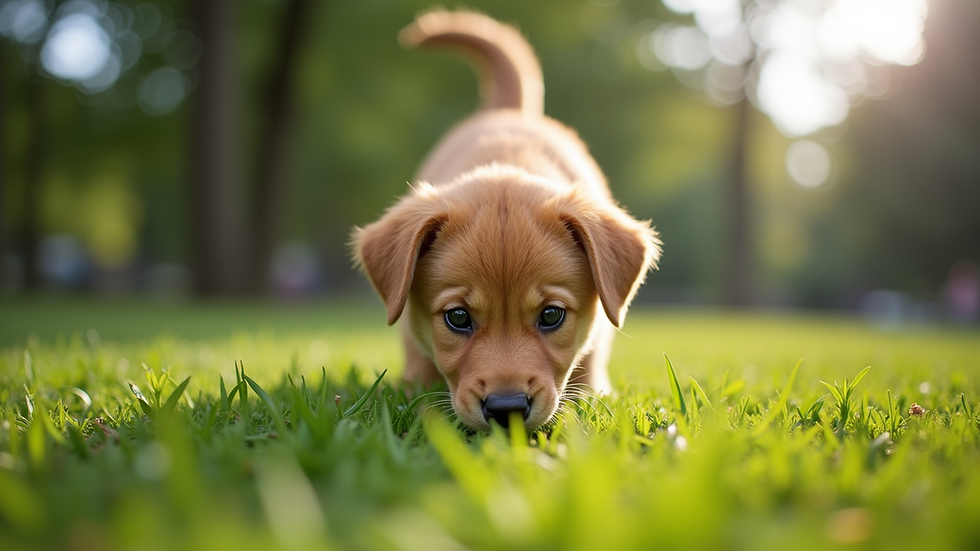Puppy Socialization and Training Essentials
- Stephen Dube
- Sep 23, 2025
- 4 min read
Bringing a new puppy home is an exciting adventure. It’s also a big responsibility. One of the most important things we can do for our puppies is to help them become well-adjusted, confident dogs. This means focusing on puppy socialization and training from the very start. When done right, it sets the foundation for a lifetime of good behavior and a strong bond between you and your furry friend.
In this post, I’ll share practical tips and gentle guidance on how to socialize and train your puppy effectively. Whether you’re a first-time dog owner or looking to improve your current approach, these essentials will help you raise a happy, well-mannered companion.
Why Puppy Socialization Techniques Matter
Socialization is the process of exposing your puppy to new experiences, people, animals, and environments in a positive way. It helps them learn how to react calmly and confidently to the world around them. Without proper socialization, puppies can grow up fearful, anxious, or even aggressive.
Here are some key puppy socialization techniques that I recommend:
Introduce new people gently: Invite friends and family over to meet your puppy calmly. Let your puppy approach at their own pace.
Expose to different sounds: Play recordings of everyday noises like traffic, vacuum cleaners, or doorbells at low volume. Gradually increase the volume as your puppy gets comfortable.
Meet other dogs safely: Arrange playdates with vaccinated, friendly dogs. Supervise closely to ensure positive interactions.
Explore various environments: Take your puppy to parks, pet-friendly stores, and quiet streets. Let them sniff and observe new sights.
Handle your puppy often: Touch their paws, ears, and mouth gently to get them used to being handled for grooming and vet visits.
Socialization is not a one-time event. It’s a continuous process during the first few months of your puppy’s life. The goal is to create positive associations with new experiences so your puppy feels safe and curious, not scared.

How to Start Training Your Puppy with Confidence
Training your puppy is just as important as socialization. It teaches your dog how to behave and communicate with you. The best training is positive, consistent, and fun for both of you.
Here’s how I suggest starting:
Use positive reinforcement: Reward good behavior with treats, praise, or play. This encourages your puppy to repeat those actions.
Keep training sessions short: Puppies have short attention spans. Aim for 5-10 minute sessions several times a day.
Teach basic commands first: Start with simple commands like “sit,” “stay,” “come,” and “down.” Use clear, consistent words.
Be patient and gentle: Puppies are learning. Avoid punishment or harsh corrections. Instead, redirect unwanted behavior calmly.
Create a routine: Consistency helps your puppy understand what’s expected. Set regular times for feeding, potty breaks, and training.
Remember, training is a journey. Celebrate small wins and stay positive. Your puppy will respond best when they feel safe and loved.

What is the Best Age to Start Puppy Training Classes?
Starting training early is key to success. The ideal time to begin is between 8 and 16 weeks old. This is when puppies are most receptive to learning and socializing.
During this critical period, enrolling in professional puppy training and socialization classes can be incredibly helpful. These classes provide:
A safe environment for your puppy to meet other dogs and people.
Expert guidance on training techniques.
Opportunities to practice commands and social skills.
Support for common challenges like biting, chewing, and potty training.
If you miss this window, don’t worry. It’s never too late to start training, but early socialization and training give your puppy the best chance to grow into a well-behaved adult dog.

Common Challenges and How to Overcome Them
Training and socializing a puppy isn’t always easy. You might face some bumps along the way. Here are a few common challenges and how to handle them:
Biting and nipping: Puppies explore with their mouths. Redirect biting to chew toys and praise gentle play.
Fear of new things: Move slowly and use treats to create positive associations. Never force your puppy into scary situations.
House training accidents: Take your puppy outside frequently, especially after eating or sleeping. Praise them when they go potty outside.
Excessive barking: Identify triggers and teach a “quiet” command. Reward calm behavior.
Separation anxiety: Practice short departures and arrivals. Provide toys and comfort items when you leave.
If you feel stuck, don’t hesitate to seek help from a professional trainer. Sometimes a little extra support makes all the difference.
Creating a Lifelong Bond Through Training and Socialization
The time and effort you invest in your puppy’s socialization and training pay off in a strong, loving relationship. Your dog will trust you, listen to you, and enjoy spending time with you.
Here are some final tips to keep your bond strong:
Be consistent: Use the same commands and rules every day.
Stay patient: Learning takes time. Celebrate progress, not perfection.
Make training fun: Use games, toys, and treats to keep your puppy engaged.
Keep socializing: Continue exposing your dog to new experiences throughout their life.
Show love and affection: Your puppy thrives on your attention and care.
By focusing on these essentials, you’re setting your puppy up for a happy, confident future. Remember, every dog is unique. Adjust your approach to fit your puppy’s personality and needs.
Training and socialization are the keys to a joyful life with your dog. If you want expert guidance, consider joining puppy training and socialization classes. They provide a supportive community and professional help to make this journey easier and more rewarding.
Enjoy every moment with your new best friend. You’re building more than just good behavior - you’re building a lifelong friendship.




Comments